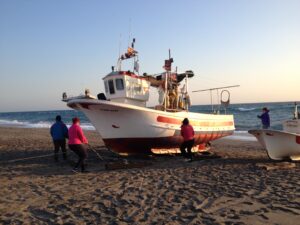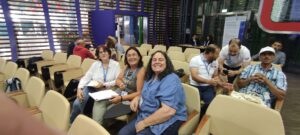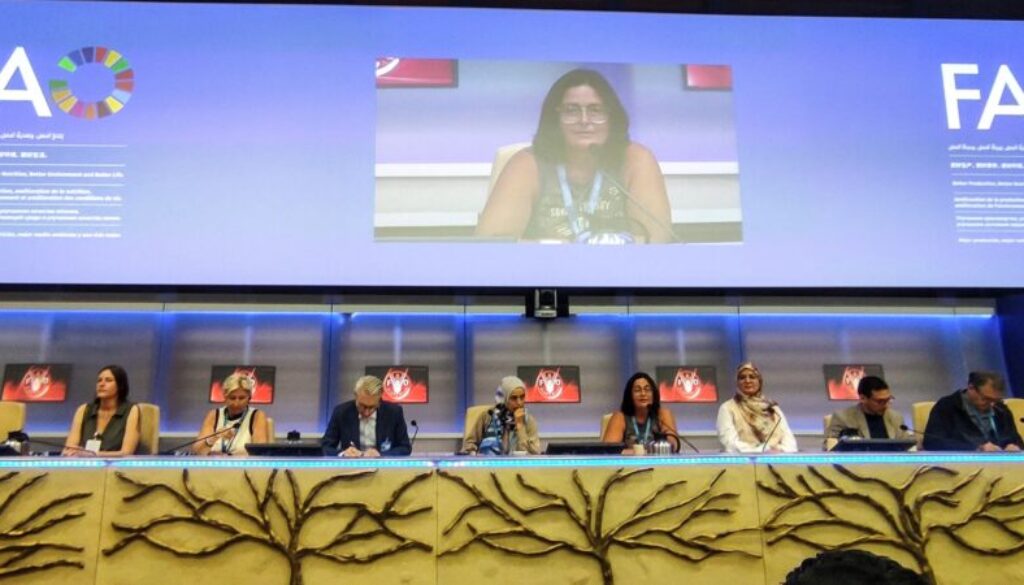Interview by LIFE Policy Advisor Brian O’Riordan with Macarena Molina, from the PESCARTES Association based in Almeria, South East Spain.
The Regional Plan of Action for Small-scale Fisheries in the Mediterranean and Black Sea (RPOA SSF) is a ground-breaking fisheries management instrument. It is the first and only international plan of action for small-scale fisheries adopted by a Regional Fisheries Management Organisation anywhere in the world. It was adopted by the General Fisheries Commission for the Mediterranean and the Black Sea (GFCM) in 2018 through a Ministerial Declaration by high-level representatives from 18 Mediterranean and Black Sea countries, along with European Union. This followed 5 years of steady work and extensive stakeholder consultations.
The process towards the RPOA SSF was initiated in 2013 at the First Regional Symposium on Sustainable Small-Scale Fisheries in the Mediterranean and Black Sea, held in Malta, and organized by the GFCM in collaboration with the FAO and other partners. It aims to secure the long-term environmental, economic and social sustainability for small-scale fisheries. For further details, click on this link.
The RPOA aims to achieve its objectives within a decade – by 2028. 2024 marks a mid-term point in its implementation.
To celebrate this milestone, the GFCM organised a stakeholder consultation in Rome within the framework of the 2nd International Small-Scale Fisheries Summit . Stakeholders included in the consultation were small-scale fisher representatives from a number of Mediterranean countries (Morocco, Türkiye, Algeria, Malta, Italy, Cyprus, Greece, Spain and France, amongst others). The consultation was not so much to provide an assessment of the implementation of the RPOA SSF, but an opportunity to gather impressions and feedback on the state of play on the key issues addressed by the RPOA SSF, and to raise awareness about this unique instrument.
Amongst stakeholders attending the RPOA SSF consultation was Macarena Molina from Spain. We asked her to give us her views on the Rome event, the implementation of the RPOA SSF, and issues arising.
For some background on Macarena and her work, click on this link
Macarena, please can you tell us something about yourself and the association you represent?
I am a member of PESCARTES, an association of small-scale fishers who fish in a marine protected area on the Southeast tip of Spain, in the western Mediterranean, within the Cabo de Gata – Nijar Nature Reserve.
This association was created in 2004 on the initiative of the fishermen to address the lack of representation of our sector (small-scale fishing) with the competent fisheries authorities. At that time, we were the only such organization, but we felt that our initiative was so necessary that despite all the difficulties and pressures, we continued forward with our work to protect our environment and our livelihoods.

Please tell us something about the issues discussed in Rome, their relevance to your situation and to other parts of the Mediterranean.
Today, twenty years after our association was created, the GFCM invited us to Rome to participate in an event on the RPOA SSF at the FAO SSF Summit. We felt very much at home; we felt that this event was for us, the small-scale fishermen and fisherwomen.
We identified very closely with all the topics discussed; they were very relevant and accessible to us. After several years of engaging in the RPOA SSF, many of the attendees were familiar to us; we were meeting old friends. I am amazed at how quickly we have created a community across the seas, especially as we fishers are so anchored in our own communities. As well as many familiar faces, we made new contacts with whom we found many more issues in common than issues that divide us. It was inspiring to find that there are so many of us who share so many concerns about protecting our resources and way of life. This greatly encourages us to continue our work.
My participation was linked to the “Mid-term evaluation of the RPOA SSF”, where we were asked to discuss what the RPOA SSF has achieved since its inception. For this exercise, we were split into different language groups. In our Spanish group, we were all fisherwomen. There was a very short time available for the discussions, but we were agile and we had the possibility to exchange impressions with groups of other nationalities (Italy, Turkey, etc.). This reinforced, once again, that there are many more issues that unite us than divide us.
One key observation was that we lacked information about how this regional plan has been going from the beginning. Small-scale fishers, who are often outside the “official” circles of fishing organizations, do not receive any information. If, and when we do receive it, it is difficult to fully understand how such “paper” plans have the potential to support us in our daily lives. We need more time to understand the scope of this type of measure, and we need structures in place to ensure that this information reaches us. In our particular case, belonging to the Low Impact Fishers of Europe (LIFE) Platform has been a great support to keep us informed and to provide a space to learn about the importance of such measures.
In our discussion group we discussed the different aspects of the RPOA SSF, and how these are impacting in our lives. We had to identify those in which, from our point of view, most progress has been made, and those where least progress has been made. In the first case, we are convinced that most progress has been achieved by making the role of women in the fishing sector more visible. In the last ten years, a large number of women’s associations have been created in the fishing sector. They have given visibility to the presence of women in all areas of small-scale fishing and they continue to work to overcome the social injustices to which women are subjected.
However, there are other aspects of small-scale fisheries where less progress has been achieved, and these relate mainly to Europe’s Common Fisheries Policy (CFP). Although there is much focus on small-scale fisheries (SSF), which has brought about great changes, there are still too many sticking points that prevent SSF from taking its rightful place.
The various provisions for the implementation of the CFP do not take into account the particularities of small-scale fisheries. Member states are reluctant to recognize the importance of this segment of the fishing fleet, fueling confrontations with other fleet segments instead of attending to the particularities of each one. The scientific community also has difficulties in applying monitoring systems designed for other fleets, which are not adapted to the characteristics of SSF. They are also uninformed and lack the know about how to use the traditional ecological knowledge of fishermen. This means that one of the main sources of direct information on the changes occurring in the marine ecosystem is being wasted.
When dealing with SSF, it is important to look beyond the extractive aspects, and to understand how these small communities have an undeniable socio-economic and cultural impact in the places they occupy. This must be taken into account.Another area where the RPOA SSF is falling short is in addressing generational renewal. It is vital to attract young people into small-scale fishing, and we need proposals on how to achieve this, and to have information on initiatives that have been successful across the world to achieve this. We have to be able to demonstrate to young people that there is a decent living to made in small-scale fishing, with a professional career full of exciting challenges. It is essential to invest in vocational training in the fishing sector and to complement it with practical experience on board small-scale fishing vessels as a basic requirement.
In our discussion groups, we also tried to evaluate how the RPOA SSF should be implemented in the future, and which aspects should be given priority. We concluded, that without any doubt, that it is generational renewal where most effort should be dedicated.
We were also in no doubt that the plan must continue and that every effort must be made to ensure that all fishermen and fisherwomen in the Mediterranean and the Black Sea are informed about it and included in it. The plan must be understood by those who directly and indirectly benefit from it.
Finally, we were asked what a sustainable and resilient fishing sector would look like for us in 2028. We answered as follows:
There must be full social integration of the SSF, incorporating other structures and cooperating with wider society. Fishermen must recover the social “prestige” they have previously enjoyed; we have to secure generational renewal; we need the capacity to be able to study the populations of target species, and to build the capacity to adapt to the changes observed in the ecosystem. Inter/intra-sectoral cooperation must be improved by encouraging participation; and we need to be represented by high quality organizations that are well governed and with a high level of participation.

Looking to the future of the RPOA SSF, we hope that member states and fishing communities will take a more active role in implementation. We hope that tools can be designed to evaluate the social, economic and environmental aspects of the implementation of the plan, so that we can see more clearly the way forward to achieve the objectives set.
Other challenges for the SSF that we agreed on and which we highlighted, included the decarbonization of the fleet and the need to test new propulsion systems which can reduce CO2 emissions; the protection of resources against new threats such as offshore windfarms, and how to seize the opportunities offered by the blue economy.
We believe that the plan still has a long way to go and that it should remain active until it achieves its objectives, and that fishermen and fisherwomen should demand greater commitment from their governments for its fulfilment.
What is clear is that thinking about a plan is the first step to achieve the objectives. So, we are grateful for this initiative and thankful that the SSF fishing communities are not giving up despite all the difficulties they face.




